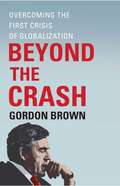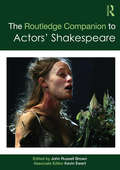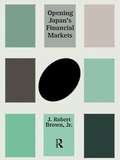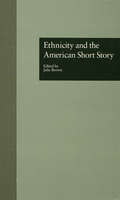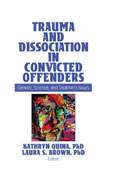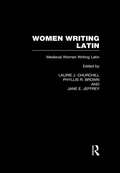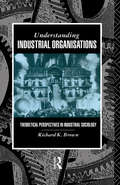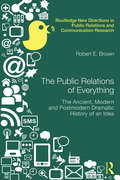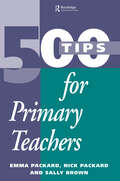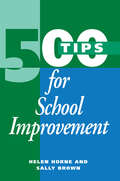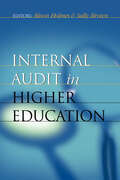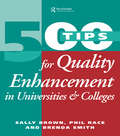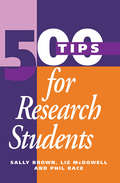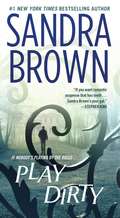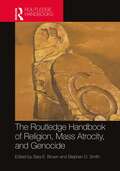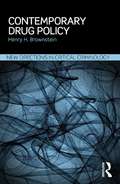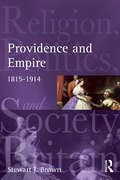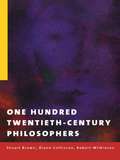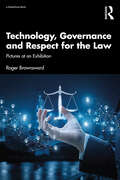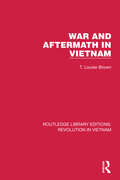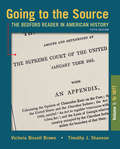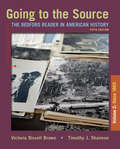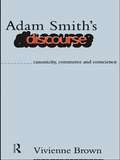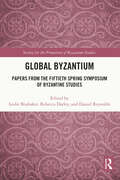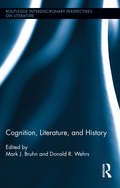Special Collections
Benetech’s Global Certified Accessible Titles
Description: Benetech’s GCA program is the first independent third-party EPUB certification to verify ebook accessibility. By creating content that is born accessible, publishers can meet the needs of all readers. Learn more: https://bornaccessible.benetech.org/
- Table View
- List View
Beyond the Crash
by Gordon BrownThe international financial crisis that has held our global economy in its grip for too long still seems to be in full stride. Former British Prime Minister and Chancellor of the Exchequer Gordon Brown believes the crisis can be reversed, but that the world’s leaders must work together if we are to avoid a decade of lost jobs and low growth. Brown speaks both as someone who was in the room driving discussions that led to some crucial decisions and as an expert renowned for his remarkable financial acumen. No one who had Brown’s access has written about the crisis yet, and no one has written so convincingly about what the global community must do next in order to climb out of this abyss. Brown outlines the shocking recklessness and irresponsibility of the banks that he believes contributed to the depth and breadth of the crisis. As he sees it, the crisis was brought on not simply by technical failings, but by ethical failings too. Brown argues that markets need morals and suggests that the only way to truly ensure that the world economy does not flounder so badly again is to institute a banking constitution and a global growth plan for jobs and justice. Beyond the Crash puts forth not just an explanation for what happened, but a directive for how to prevent future financial disasters. Long admired for his grasp of economic issues, Brown describes the individual events that he believes led to the crisis unfolding as it did. He synthesizes the many historical precedents leading to the current status, from the 1933 London conference of world leaders that failed to resolve the Great Depression to the more recent crash in the Asian housing market. Brown’s analysis is of paramount importance during these uncertain financial times. As Brown himself said of his ideas for the future, “We now live in a world of global trade, global financial flows, global movements of people, and instant global communications. Our economies are connected as never before, and I believe that global economic problems require global solutions and global institutions. In writing my analysis of the financial crisis, I wanted to help explain how we got here, but more important, to offer some recommendations as to how the next stage of globalization can be managed so that the economy works for people and not the other way around.”## ***The crisis exposed the contradiction of globalization itself: as economies have become more interconnected, regulators and governments have failed to keep pace and increase coordination. It is a failure intrinsic to unregulated global markets, an instability that resulted from the manner in which increasing flows of capital around the world happened and impacted the economy. And it is a failure of collective action at an international level to respond quickly enough to the structural imbalances and inequities that arose. At its simplest, then, this is the first true crisis of globalization. For the first time everybody, from the richest person in the richest city to the poorest person in the poorest slum, was affected by the same crisis. Although its roots are global, its impact is local, directly felt on nearly every main street, on nearly every shop floor, around nearly every kitchen table. Billions of people around the world are in need of and are demanding a better globalization. It is the nature of power that you always leave tasks unfinished when you leave office. It is the nature of politics that the argument must continue. This book is my warning of a decade of lost growth and my answer to that fear with a call for a better globalization. It is an explanation of a pattern in the numbers that points to an enormous opportunity to alleviate poverty, create jobs, and grow. A future of low growth, high unemployment, decline, and decay is not inevitable; it’s about the change we choose. -- From Beyond the Crash
The Routledge Companion to Actors' Shakespeare
by John Russell BrownThe Routledge Companion to Actors’ Shakespeare is a window onto how today’s actors contribute to the continuing life and relevance of Shakespeare’s plays. The process of acting is notoriously hard to document, but this volume reaches behind famous performances to examine the actors’ craft, their development and how they engage with playtexts. Each chapter relies upon privilieged access to its subject to offer an unparalleled insight into contemporary practice. This volume explores the techniques, interpretive approaches and performance styles of the following actors: Simon Russell Beale, Sinead Cusack, Judi Dench, Kate Duchene, Colm Feore, Mariah Gale, John Harrell, Greg Hicks, Rory Kinnear, Kevin Kline, Adrian Lester, Marcelo Magni, Ian McKellen, Patrice Naiambana, Vanessa Redgrave, Piotr Semak, Anthony Sher, Jonathan Slinger, Kate Valk, Harriet Walter This twin volume to The Routledge Companion to Directors’ Shakespeare is an essential work for both actors and students of Shakespeare.
Opening Japan's Financial Markets
by J. Robert Brown Jr.It is widely asserted, outside Japan, that the failure of foreign banks to penetrate Japanese financial markets is the direct result of stringent Japanese protectionist policies. However, although there may be some truth in this, it is a one-dimensional argument. Opening Japan's Financial Markets takes a broader view. It accepts that the Japanese bureaucracy have skillfully limited the scope of foreign banks. However, in examining the history of foreign banking activity in Japan, it becomes clear that ineptitude on the part of foreign banks and governments has also been a major factor.
Ethnicity and the American Short Story
by Julie BrownHow do different ethnic groups approach the short story form? Do different groups develop culture-related themes? Do oral traditions within a particular culture shape the way in which written stories are told? Why does "the community" loom so large in ethnic stories? How do such traditional forms as African American slave narratives or the Chinese talk-story shape the modern short story? Which writers of color should be added to the canon? Why have some minority writers been ignored for such a long time? How does a person of color write for white publishers, editors, and readers?Each essay in this collection of original studies addresses these questions and other related concerns. It is common knowledge that most scholarly work on the short story has been on white writers: This collection is the first work to specifically focus on short story practice by ethnic minorities in America, ranging from African Americans to Native Americans, Chinese Americans to Hispanic Americans. The number of women writers discussed will be of particular interest to women studies and genre studies researchers, and the collections will be of vital interest to scholars working in American literature, narrative theory, and multicultural studies.
Trauma and Dissociation in Convicted Offenders
by Laura S. Brown and Kathryn QuinaBetter understand the men and women most affected by trauma in our society Convicted offenders quite often are found to have a history of trauma. Trauma and Dissociation in Convicted Offenders: Gender, Science, and Treatment Issues provides a comprehensive look at the connection between complex trauma and the likelihood of being a convicted offender. This unique text focuses on what factors increase the likelihood of being a convicted offender, and what treatment possibilities lay ahead for these individuals. Substance abuse, childhood sexual abuse, and other traumatic experiences and their links to incarcerated men and women are discussed in detail. Interventions and research within the corrections system are examined, with recommendations on how to better serve this population. Trauma and Dissociation in Convicted Offenders: Gender, Science, and Treatment Issues takes a reasoned stand on women and men in prison, understanding that while they are being punished for breaking the law, they also are survivors of trauma whose dysfunctions underscore the need for greater understanding and more research. This valuable source presents the most current research results while providing a clear view on important future directions of study and focus. Each chapter of this insightful resource is extensively referenced and many have tables to clearly present data. Topics in Trauma and Dissociation in Convicted Offenders: Gender, Science, and Treatment Issues include: the relationship between post-traumatic stress and lifetime substance abuse among incarcerated women research on women inmates with HIV sexual risk and hazardous drinking behavior study on the link between trauma and women domestic violence offenders dissociation and memory in sex abusers the &’re-criminalization&’ of mental illness the effectiveness of group therapy for incarcerated women survivors of childhood sexual abuse (CSA) challenges, ethical issues, and benefits of conducting research with abuse survivors in a women's prison facility Trauma and Dissociation in Convicted Offenders: Gender, Science, and Treatment Issues is an essential resource for clinicians, educators, students, policymakers, and researchers.
Women Writing Latin
by Laurie J. Churchill and Phyllis R. Brown and Jane E. JeffreyThis book is part of a 3-volume anthology of women's writing in Latin from antiquity to the early modern era. Each volume provides texts, contexts, and translations of a wide variety of works produced by women, including dramatic, poetic, and devotional writing. Volume Two covers women's writing in Latin in the Middle Ages.
Understanding Industrial Organizations
by Richard Brown and Prof Richard BrownUnderstanding Industrial Organizations critically reviews the approaches developed by industrial sociologists to analyze industrial organizations. It outlines four general perspectives on organizations - systems thinking, contingency approach, the action approach and labour process for a more adequate sociology of organizations. The book provides a clear, relevant and important contribution to the sociology of organizations.
The Public Relations of Everything
by Robert E. BrownThe public relations of "everything" takes the radical position that public relations is a profoundly different creature than a generation of its scholars and teachers have portrayed it. Today, it is clearly no longer limited, if it ever has been, to the management of communication in and between organizations. Rather, it has become an activity engaged in by everyone, and for the most basic human reasons: as an act of self-creation, self-expression, and self-protection. The book challenges both popular dismissals and ill-informed repudiations of public relations, as well as academic and classroom misconceptions. In the age of digitization and social media, everyone with a smart phone, Twitter and Facebook accounts, and the will and skill to use them, is in the media. The PR of everything – the ubiquitousness of public relations – takes a perspective that is less concerned with ideas of communication and information than with experience and drama, a way of looking at public relations inside out, upside down and from a micro rather than a macro level. Based on a combination of the research of PR practice and critical-thinking analysis of theory, and founded in the author’s extensive corporate experience, this book will be invaluable reading for scholars and practitioners alike in Public Relations, Communications and Social Media.
500 Tips for Primary School Teachers
by Sally Brown and Nick Packard and Emma PackardThis manual provides practical advice and tips on dealing with aspects of the primary teacher's role, from classroom organization to professional development.
500 Tips for School Improvement
by Sally Brown and Helen HorneSchools now have to prove that they are effective learning organizations. To achieve this, management competences must evolve at the same time as staff development and training. This text provides useful tips covering all aspects of school management and individual effectiveness.
Internal Audit in Higher Education
by Sally Brown and Alison HolmesThis volume describes a range of experiences of internal audit in higher education institutions from the UK, USA, Australia, New Zealand, South Africa and Germany. It presents approaches to best practice designed to enable readers to assess and develop their own audit procedures.
500 Tips for Quality Enhancement in Universities and Colleges
by Race, Phil and Brown, Sally and Smith, BrendaThis handbook seeks to provide practical, realistic suggestions about how quality can be measured, maintained and improved in institutions. It is addressed to a cross-section of staff who make up colleges and universities, not just those responsible for quality audit.
500 Tips for Research Students
by Race, Phil and Brown, Sally and McDowell, LizThis text offers researchers practical hints and advice as well as support/guidance in planning, carrying out, writing up and publishing research findings. Topics covered include: information handling; time and self-management; writing; dealing with others; and publishing and profile.
Play Dirty
by Sandra Brown#1 New York Times bestselling author Sandra Brown is back with a gripping story of obsession and its deadly consequences. After five long years in federal prison, Griff Burkett is a free man. But the disgraced Cowboys quarterback can never return to life as he knew it before he was caught cheating. In a place where football is practically a religion, Griff committed a cardinal sin, and no one is forgiving. Foster Speakman, owner and CEO of SunSouth Airlines, and his wife, Laura, are a golden couple. Successful and wealthy, they lived a charmed life before fate cruelly intervened and denied them the one thing they wanted most -- a child. It's said that money can't buy everything. But it can buy a disgraced football player fresh out of prison and out of prospects. The job Griff agrees to do for the Speakmans demands secrecy. But he soon finds himself once again in the spotlight of suspicion. An unsolved murder comes back to haunt him in the form of his nemesis, Stanley Rodarte, who has made Griff's destruction his life's mission. While safeguarding his new enterprise, Griff must also protect those around him, especially Laura Speakman, from Rodarte's ruthlessness. Griff stands to gain the highest payoff he could ever imagine, but cashing in on it will require him to forfeit his only chance for redemption...and love. Griff is now playing a high-stakes game, and at the final whistle, one player will be dead. Play Dirty is Sandra Brown's wildest ride yet, with hairpin turns of plot all along the way. The clock is ticking down on a fallen football star, who lost everything because of the way he played the game. Now his future -- his life -- hinges on one last play.
The Routledge Handbook of Religion, Mass Atrocity, and Genocide
by Sara E. BrownThe Routledge Handbook of Religion, Mass Atrocity, and Genocide explores the many and sometimes complicated ways in which religion, faith, doctrine, and practice intersect in societies where mass atrocity and genocide occur. This volume is intended as an entry point to questions about mass atrocity and genocide that are asked by and of people of faith and is an outstanding reference source to the key topics, historical events, and heated debates in this subject area. The 39 contributions to the handbook, by a team of international contributors, span five continents and cover four millennia. Each explores the intersection of religion, faith, and mainly state-sponsored mass atrocity and genocide, and draws from a variety of disciplines. This volume is divided into six core sections: Genocide in Antiquity and Holy Wars The Genocide of Indigenous Peoples Religion and the State The Role of Religion during Genocide Post Genocide Considerations Memory Culture Within these sections central issues, historical events, debates, and problems are examined, including the Crusades; Jihad and ISIS, colonialism, the Holocaust, desecration of ritual objects, politics of religion, Shinto nationalism, attacks on Rohingya Muslims; the Genocide against the Tutsi in Rwanda, responses to genocide; gender-based atrocities, ritualcide in Cambodia, burial sites and mass graves, transitional justice, forgiveness, documenting genocide, survivor memory narratives, post-conflict healing and memorialization. The Routledge Handbook of Religion and Genocide is essential reading for students and researchers with an interest in religion and genocide, religion and violence, and religion and politics. It will be of great interest to students of theology, philosophy, genocide studies, narrative studies, history, and international relations and those in related fields, such as cultural studies, area studies, sociology, and anthropology.
Contemporary Drug Policy
by Henry H BrownsteinThis book focuses on the use of drugs in our lives and how we respond to them. Whereas drug policy typically centres on the problems of illicit drugs or licit drugs used in illicit ways or circumstances, Contemporary Drug Policy instead considers the wide variety of substances we call drugs as a normal part of our personal and social experience and asks how and when drugs benefit us as well as how and when they are harmful. The evidence is clear that at some times, in some circumstances, and in some places drugs are a problem. This book does not ignore these issues but shifts our attention to making policies that also recognize their legitimate and constructive place in society. It focuses on asking questions, challenging assumptions, and developing responses to drugs based on evidence from scientific study as directed by critical criminological theory rather than mainstream theory or unfounded assumptions. Different from other books on drug policy, this book does not offer answers or solutions. Rather it shows how critical criminological theories can lead scientific research in new directions supportive of policies that offer both solutions to problems that are found to be related to drugs and an appreciation for the benefits that drugs can bring to people and society. This book will be of interest to those studying or researching drug policy as well as professionals involved in policy making processes.
Providence and Empire
by Stewart BrownThe 19th century was, to a large extent, the ‘British century’. Great Britain was the great world power and its institutions, beliefs and values had an immense impact on the world far beyond its formal empire. Providence and Empire argues that knowledge of the religious thought of the time is crucial in understanding the British imperial story. The churches of the United Kingdom were the greatest suppliers of missionaries to the world, and there was a widespread belief that Britain had a divine mission to spread Christianity and civilisation, to eradicate slavery, and to help usher in the millennium; the Empire had a providential purpose in the world. This is the first connected account of the interactions of religion, politics and society in England, Scotland, Ireland and Wales between 1815 and 1914. Providence and Empire is essential reading for any student who wishes to gain an insight into the social, political and cultural life of this period.
One Hundred Twentieth-Century Philosophers
by Stuart Brown and Robert Wilkinson and Diané CollinsonOne Hundred Twentieth-Century Philosophers offers biographical information and critical analysis of the life, work and impact of some of the most significant figures in philosophy this century.Taken from the acclaimed Biographical Dictionary of Twentieth-Century Philosophers, the 100 entries are alphabetically organised, from Adorno to Zhang Binglin, and cover individuals from both continental and analytic philosophy.The entries have an identical four-part structure making it easy to compare and contrast information, comprising:* biographical details * a bibliography of major works * a listing of relevant secondary and critical literature * an appraisal of the philosopher's thoughts and achievements.A separate glossary provides an introduction to the origins, development and main features of major philosophical schools and movements and offers select bibliographies to guide the reader to further research.
Technology, Governance and Respect for the Law
by Roger BrownswordIn the context of the technological disruption of law and, in particular, the prospect of governance by machines, this book reconsiders the demand that we should respect the law, simply because it is the law. What does ‘the law’ need to look like to justify our respect? Responding to this question, the book takes the form of a dialectic between, on the one side, the promise of the prospectus for law and, on the other, the discontent provoked by the performance of law in practice; this is followed by a synthesis. Four pictures of law are considered: two are traditional pictures – law as order and law as just order; and two are prompted by the technological disruption of law – law as governance by machines and law as self-governance by humans. These pictures are tested in five performance areas: contract law, criminal law, biolaw, information law, and constitutional law. The synthesis, revealing the complexity of the demand for respect, highlights three particular points. First, the only prospectus for law that clearly commands respect is one that is committed to protecting the global commons (the preconditions for humans to form their own communities with their own forms of governance); second, any form of governance by humans will invite reservations and push-back against the demand for respect; and, third, governance by machines is not so much a superior form of governance as a radically different form in which questions about respect are redundant. This book will appeal to scholars and students with interests in the broad and burgeoning field of law, regulation and technology, as well as to legal theorists, practitioners, and others interested in the impact of new technology on law.
War and Aftermath in Vietnam
by T. Louise BrownThis book, first published in 1991, attempts to combine a broad understanding of the background to the conflict in Vietnamese and world history with detailed material on US military tactics and the failure of pacification. There are chapters on the US presidential administrations of Johnson, Kennedy and Nixon; religion, culture and society in North and South Vietnam, and the nature of the ‘People's Revolutionary War’.
Brown and Shannon/Going to the Source, Volume 1
by Victoria Brown and Timothy ShannonMany document readers offer lots of sources, but only Going to the Source combines a rich selection of primary sources with in-depth instructions for how to use each type of source. Mirroring the chronology of the U.S. history survey, each chapter familiarizes students with a single type of source while focusing on an intriguing historical episode such as the Cherokee Removal or the 1894 Pullman Strike. Students practice working with a diverse range of source types including photographs, diaries, oral histories, speeches, advertisements, political cartoons, and more. A capstone chapter in each volume prompts students to synthesize information on a single topic from a variety of source types. The wide range of topics and sources across 28 chapters provides students with all they need to become fully engaged with America’s history.
Brown and Shannon/Going to the Source, Volume 2
by Victoria Brown and Timothy ShannonMany document readers offer lots of sources, but only Going to the Source combines a rich selection of primary sources with in-depth instructions for how to use each type of source. Mirroring the chronology of the U.S. history survey, each chapter familiarizes students with a single type of source while focusing on an intriguing historical episode such as the Cherokee Removal or the 1894 Pullman Strike. Students practice working with a diverse range of source types including photographs, diaries, oral histories, speeches, advertisements, political cartoons, and more. A capstone chapter in each volume prompts students to synthesize information on a single topic from a variety of source types. The wide range of topics and sources across 28 chapters provides students with all they need to become fully engaged with America’s history.
Adam Smith's Discourse
by Vivienne BrownAdam Smith's name has become synonymous with free market economics; The Wealth of Nations is taken as the definitive account of the benefits of free competitive markets. Yet recent scholarship has challenged this view and given us a richer, more nuanced figure, steeped in the intricacies of enlightenment social and political philosophy. Adam Smith's Discourse both develops this literature and gives it a radical new extension by taking into account recent debates in literary theory.
Global Byzantium
by Daniel Reynolds and Leslie Brubaker and Rebecca DarleyGlobal Byzantium is, in part, a recasting and expansion of the old ‘Byzantium and its neighbours’ theme with, however, a methodological twist away from the resolutely political and toward the cultural and economic. A second thing that Global Byzantium – as a concept – explicitly endorses is comparative methodology. Global Byzantium needs also to address three further issues: cultural capital, the importance of the local, and the empire’s strategic geographical location. Cultural capital: in past decades it was fashionable to define Byzantium as culturally superior to western Christian Europe, and Byzantine influence was a key concept, especially in art historical circles. This concept has been increasingly criticised, and what we now see emerging is a comparative methodology that relies on the concept of ‘competitive sharing’, not blind copying but rather competitive appropriation. The importance of the local is equally critical. We need to talk more about what the Byzantines saw when they ‘looked out’, and what others saw in Byzantium when they ‘looked in’ and to think about how that impacted on our, very post-modern, concepts of globalism. Finally, we need to think about the empire’s strategic geographical position: between the fourth and the thirteenth centuries, if anyone was travelling internationally, they had to travel across (or along the coasts of) the Byzantine Empire. Byzantium was thus a crucial intermediary, for good or for ill, between Europe, Africa, and Asia – effectively, the glue that held the Christian world together, and it was also a critical transit point between the various Islamic polities and the Christian world.
Cognition, Literature, and History
by Donald R. Wehrs and Mark J. BruhnCognition, Literature, and History models the ways in which cognitive and literary studies may collaborate and thereby mutually advance. It shows how understanding of underlying structures of mind can productively inform literary analysis and historical inquiry, and how formal and historical analysis of distinctive literary works can reciprocally enrich our understanding of those underlying structures. Applying the cognitive neuroscience of categorization, emotion, figurative thinking, narrativity, self-awareness, theory of mind, and wayfinding to the study of literary works and genres from diverse historical periods and cultures, the authors argue that literary experience proceeds from, qualitatively heightens, and selectively informs and even reforms our evolved and embodied capacities for thought and feeling. This volume investigates and locates the complex intersections of cognition, literature, and history in order to advance interdisciplinary discussion and research in poetics, literary history, and cognitive science.
